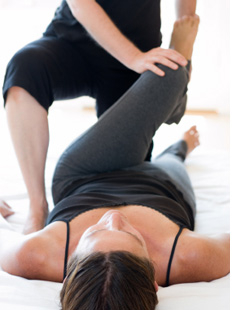If you find yourself experiencing the following symptoms: numbness, tingling, pain, and/or weakness into your hand or wrist, you could be suffering from a common condition called Carpal tunnel syndrome (CTS). Carpal tunnel syndrome is the compression of a nerve that runs down the middle of the forearm into the palm of the hand called the median nerve. This nerve passes directly through the carpal tunnel, a very narrow passageway of ligaments and bones at the wrist. . The median nerve is responsible for supplying sensation and movement to the thumb, index, middle and half of the ring finger. Swelling caused by trauma or injury, thickening of irritated tendons, repetitive use and work stress can be some causes of CTS, however it can also simply be due to a congenital reason, where some individuals are born with smaller carpal tunnels than others which may pre-dispose them to this injury.
There are two courses of action when it comes to treatment for Carpal Tunnel Syndrome: Non-surgical intervention (Physiotherapy), or surgical intervention.
Non-Surgical:
At Active Health Institute, your physiotherapist will equip you with strategies to avoid further irritation of your injury. Our physiotherapists will perform different manual therapy techniques and utilize various methods to help reduce inflammation and to help promote normal movement of the tendons and median nerve within the carpal tunnel. Education regarding proper wrist positioning, home or clinic based exercises, and tips on how to prevent future problems are also a part of our treatment. As a general rule, if you are presently suffering from Carpal Tunnel Syndrome, one should avoid activities that require repetitive motions, heavy grasping, and vibration in the hand.
Post-Surgical Rehabilitation
Carpal tunnel release may be an intervention recommended by your doctor in more advanced cases of CTS. Full recovery from surgery takes time and you may experience some pain and tenderness in the area of the incision for a few months post-surgery. Hence it is advisable to seek advice from a physiotherapist post surgery.
Initial treatment you would receive from your physiotherapist would focus on decreasing inflammation and pain reduction, eventually progressing to manual (hands-on) therapy to assist with regaining normal range of motion and exercises to give strength back to your hand and wrist. Your physiotherapist will often help desensitize your wrist and prevent scar tissue build up with some gentle soft tissue techniques as well. Physiotherapy here at Active Health Institute can help speed up your recovery, enhance your outcome of the surgery, and eventually equip you with the tools through a home exercise program to independently manage your recovery.


About The Author: Activehealthinstitute_8uxcp6
More posts by activehealthinstitute_8uxcp6